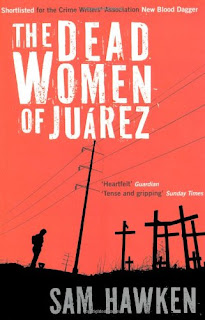I spent my weekend engrossed in this book. The Dead Women of Juarez is a fictional story about a very real ongoing tragedy in Juarez, Mexico.
At least 400 women and girls have been raped, tortured, and murdered in Juarez in the past 20 years. Hundreds more women are still missing and some locals estimate the real number of murders and disappearances to be in the thousands.
I participated in a demonstration about this when I was a freshman in college. I've talked about it a little before. It involved raw meat all over the quad. Aforementioned raw meat was supposed to be clean, white bones to symbolize these women being found in the desert as nothing but bleached bones.
I thought that this was old news, but apparently it is on-going. Efforts and attention are being diverted due to the growth of the drug cartels. But women are still being murdered.
Just a couple weeks ago, 12 people were arrested for their involvement in the murders of 11 young women who they had kidnapped, forced into prostitution and killed after they were "no longer of use." This has been a rare taste of justice as corruption and organized crime have made investigations and convictions nearly impossible.
And, as this article points out, international and political pressure by groups like Amnesty International have actually kind of backfired in this crisis. The police, being under pressure to solve these crimes, don't do a through job to make sure the right person is convicted. So, then we have two victims, the violated woman and the innocent man behind bars.
However, without international attention and political pressure, nothing would be done at all. The cultures of machismo and marianismo devalue the life of women, particularly if that woman works or attends school outside the home. Many of the victims were students and/or factory workers. Without the outside pressure, arguably, no one (but the victims' families) would care at all.
 |
| NY Times |
























































